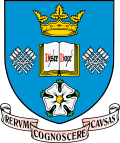A major contributor to this article appears to have a close connection with its subject.(September 2013) |
| Company type | Public (LSE: FIP) |
|---|---|
| Industry | Business Incubation Venture Capital Seed Funding Early Stage Investment Intellectual Property Commercialisation |
| Founded | Sheffield, South Yorkshire (2001) |
| Headquarters | , |
Key people | Doug Liversidge CBE (Chairman) David Baynes (CEO) |
| Website | www.fusionip.co.uk |
Fusion IP plc was a UK-based listed company that capitalised on intellectual property extracted from four UK-based universities, three of which were part of the Russell Group of universities:
Contents
- Incubation Model
- Partnerships
- University Partnerships
- Financing Partnerships
- Companies within the Fusion IP Portfolio (A-Z)
- References
- External links
It did this by creating companies around commercially opportunistic research and discoveries from the four universities. These companies were grown to eventually be sold (see spin-out companies).
Fusion IP was acquired by IP Group plc on 20 March 2014. [1]
Fusion IP was one of a handful of companies that specialised in the commercialisation of university intellectual property within the UK through the sourcing of funding from public markets. [2] The other two notable companies operating in the same field were IP Group plc (LSE : IPO) and Imperial Innovations plc (LSE : IVO). Additionally, smaller companies operated within the field of university intellectual property but did not have such a focus on spinning out companies, nor a formal contractual relationship with universities over intellectual property rights.


